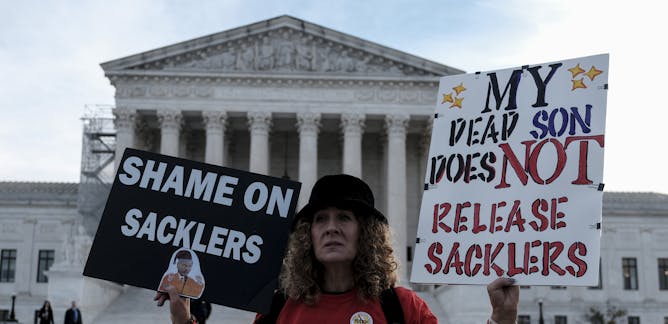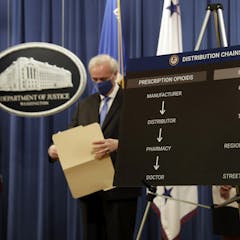
Artículos sobre Purdue Pharma
Mostrando todos artículos

The company helped spur a public health crisis through its deceptive marketing and aggressive sales of prescription opioids.

There were more than 100,000 opioid-related deaths in North America in 2022. How the crisis grew to such proportions, and three potential paths to ending it.

Making them pay is important but it’s not going to stop drugmakers from endangering public health.

The Purdue Pharma settlement is paltry compared to costs of the opioid crisis. Without major changes to pharma industry regulation, there is little reason to think a similar crisis won’t occur again.

After battling drug manufacturers and distributors in court for years, local and state governments are about to receive a windfall that could expand access to treatments that can save lives.

False narratives about drug addiction and policies that are not supported by research are deepening the overdose epidemic in the US.

The multibillion-dollar settlement will trigger the release of troves of documents that may shine new light on what caused the opioid crisis.

The government has tried to harness profit-driven drugmaking to serve public health before. The results were underwhelming.

The government has tried to harness a profit-driven drug industry to serve public health before.

While critics accuse companies facing lots of lawsuits of using bankruptcy as a sort of ‘get of jail free card,’ the reality of the legal procedure is more complicated.

A policy response focused on reducing prescription opioids will not resolve North America’s opioid crisis. And it is hurting many adults who live with otherwise unbearable chronic pain.

The $270 million settlement may not mean a whole lot if Purdue files for bankruptcy as it’s reportedly considering.

There are limits to what charities can do now about past donors who are accused of morally reprehensible behavior.

OxyContin maker Purdue has reportedly been mulling a bankruptcy filling, just as the first of around 2,000 lawsuits against it prepares to go to trial.

The interests of pharmaceutical companies and public health are not the same. Industry dollars can distort research agendas, while framing health challenges and solutions in ways that benefit corporations.

Considered in historical context, Purdue’s plan to peddle opioid addiction medicines to vulnerable people is not so surprising. Gilded-Age pharmaceutical companies used similar strategies.
